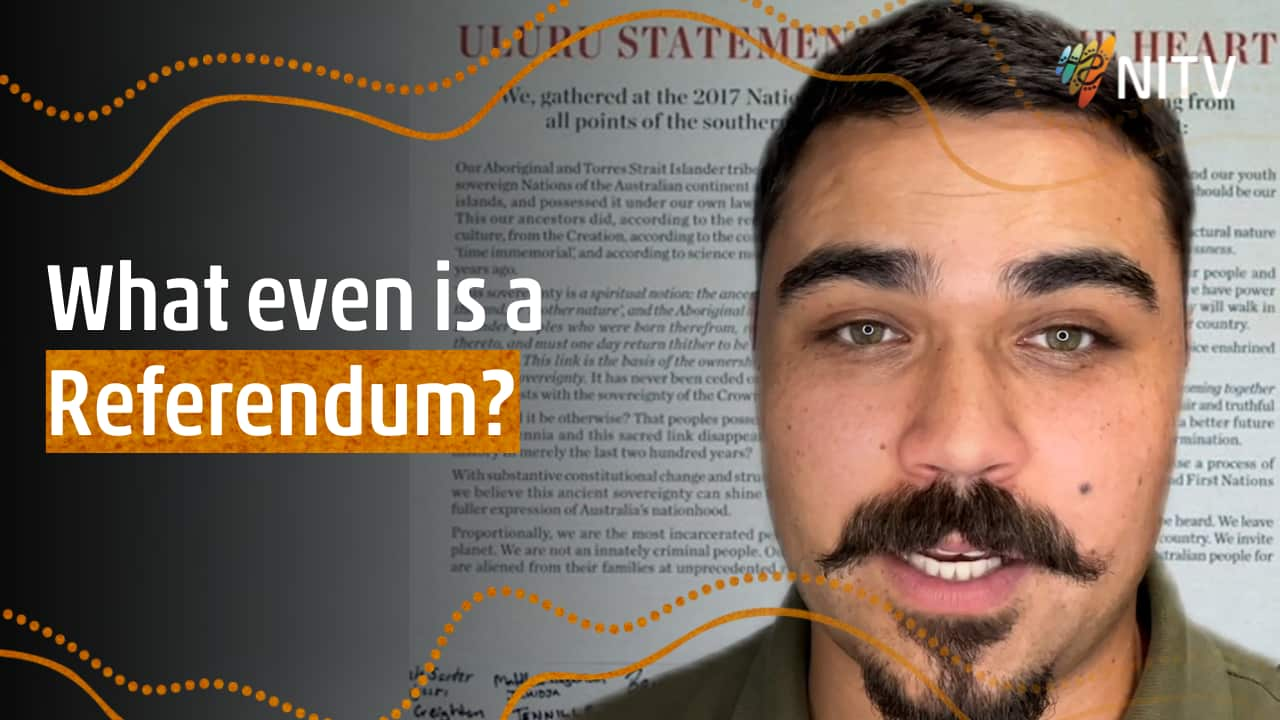In the remote community of Seisia in Queensland’s Northern Peninsula Area (NPA), Inagie Manas is working to get everyone she knows on the electoral roll.
She is particularly focused on young people.
“When I see an individual that I think is old enough, I just walk up to them and ask if they’ve been enrolled for the Australian Electoral Commission," she said. "
"Then if they haven’t, I get them to sign up. Sometimes they’re a bit shy and they don’t want to, but I just tell them it’s OK.
Aboriginal and Torres Strait Islander enrolment rates have increased across the country in recent times, with an extra 21,000 people signing up to vote in the second half of last year.
This brought the First Nations enrolment rate up to 84.5 per cent.
The Australian Electoral Commission (AEC) has said it was the biggest increase since 2017, but with the total enrolment rate across the country sitting at 97 per cent, there’s still plenty of work to be done.

Inagie Manas (R) signs up 20-year-old Pristy Atu at the Seisia supermarket Credit: NITV
She's one of four young women doing this work across the NPA communities of Bamaga, Seisia, Umagico, New Mapoon and Injinoo.
“I feel happy that we have more people enrolling to vote in my community and the NPA,” she said.
“I hope they encourage more young people to enrol. It's so important to hear our voice in our community.”
AEC deputy electoral commissioner Jeff Pope said he hopes to get the rate of Indigenous enrolment up into the 90th percentile before the referendum, which is expected later this year.
“NSW and I think Tasmania are already there but we’ve got a fair bit of work to do in some of the other states,” he said.
“This is our absolute priority and we’re not going to rest until we close that gap.”
'Politcally savvy community' essential for region
Ms Manas’s work is one of a number of remote trials being run by the AEC in a bid to get remote voter numbers up.
In the trials residents work to sign up their community to the electoral roll and spread the word about the referendum.
Talei Elu helped to get the program off the ground in the NPA and said it was important to her that her community was informed.
“Political engagement and understanding politics plays a part in the issues we’re trying to fight for,” she said.
“There’s social issues and economic issues in this region, so having a politically savvy community is really important to me and that’s why I really want to continue this project.”

Talei Elu says it is important for her community to be politically savvy. Credit: NITV
“It’s a bit hard being so remote. There’s so many FIFO workers providing services, the electoral commission being one of them,” she said.
“When someone comes up for a short amount of time to sign up a bunch of people who are going about their day with work and other commitments. you just don’t get enough people enrolling at that time.”
Confusion around the Voice
Ms Elu said telecommunications are a huge issue across the region, with serious implications for resident's access to information surrounding the national debate.
“When you don’t have a community that’s been allowed to be digitally literate because of the lack of telecommunications and digital access that puts a lot of strain on how educated people can be around the Voice.”
“A lot of people are not sure about what a referendum is and the conversation about the Voice hasn’t really hit here in a way that down south it has,” she said.
READ MORE

What even is a referendum?

Sylvia Tabua has been getting the word out about the referendum through her role as a Radio 4MW host. Source: NITV / Keira Jenkins
On nearby Waibene Thursday Island in the Torres Straitm Radio 4MW Brekky Bot host Sylvia Tabua said the station is working hard to inform the community about the upcoming referendum.
“The important thing is making sure our mob up here enrol and understand that to vote for the referendum you have to actually be enrolled,” she said.
“There’s a high percentage of our mob up here who aren’t enrolled so we have been trying to get that message across.”
Working out of the Torres Strait Island Media Authority (TSIMA), Ms Tabua said Indigenous media has an important role to play this year.
“It’s about just breaking down that information so that grass roots people can really understand because when you have that discussion people are still very confused,” she said.
The Point airs Tuesday 30 May at 7.30pm on NITV, and is available on SBS On Demand after broadcast













